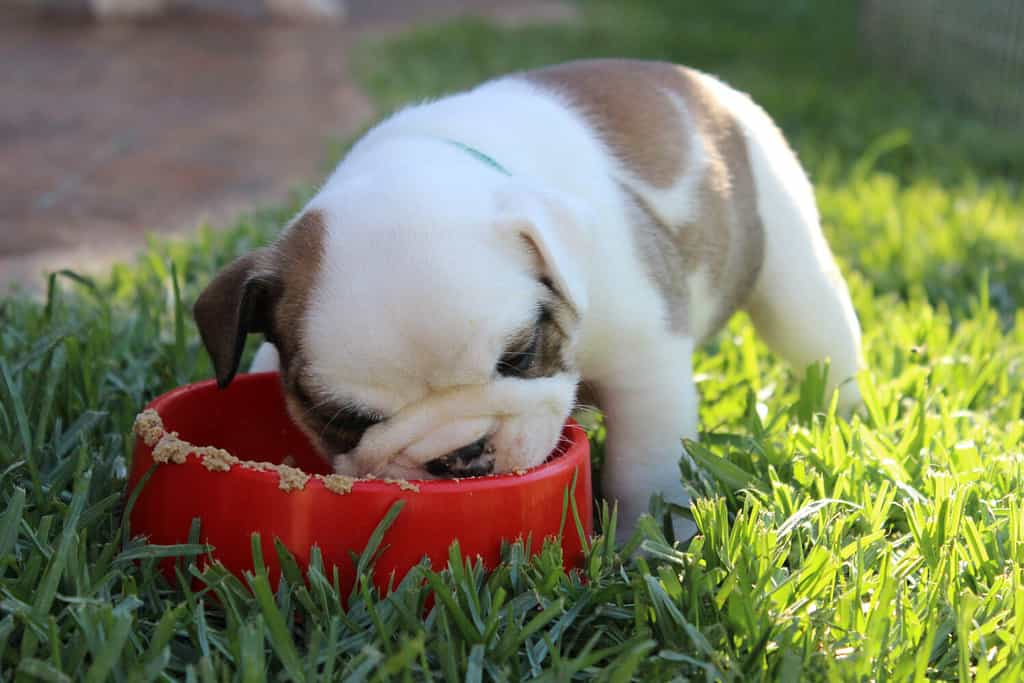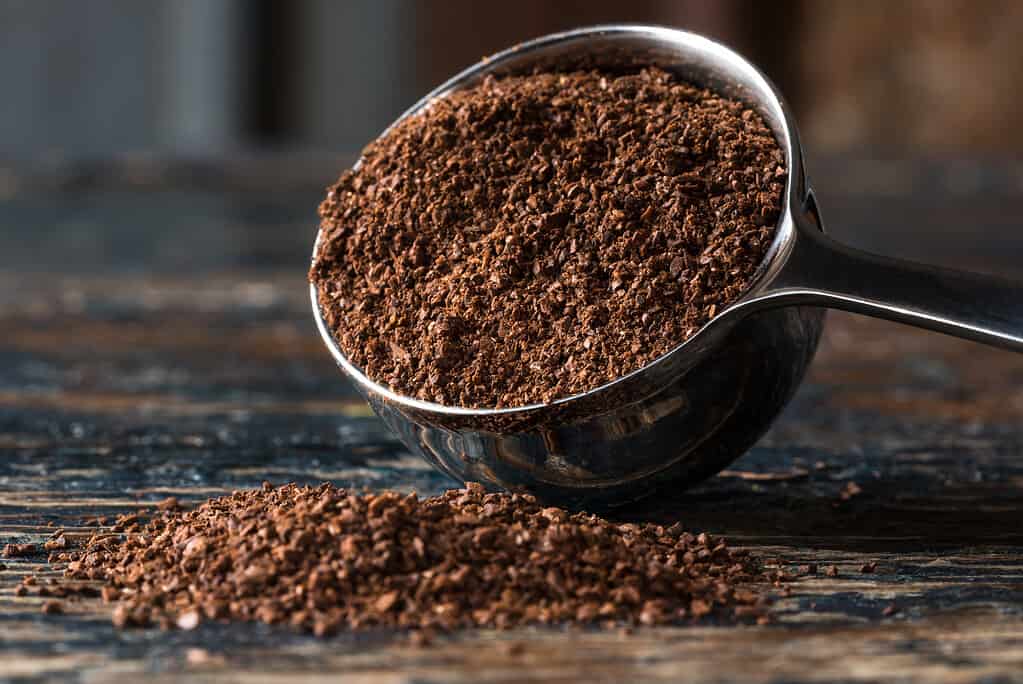Can dogs eat eggshells? Your dog’s digestive system differs from yours as a human. As a result, some foods that are beneficial to humans may be harmful or even fatal to dogs and vice versa. Understanding the types of foods, toys, and treats your dog requires to stay healthy and happy is one way to be their best friend.
You may be wondering if it’s okay for dogs to eat eggshells, whether your dog finds some on their own or if you want to give your canine companion a calcium boost. Can your dog eat eggshells? The short answer is no, your dog should not eat eggshells. There are many safer alternatives to give your pet extra calcium. We will list them all below.

While eggshells can provide your dog with additional calcium and essential amino acids, there are risks to giving your dog too much calcium.
©Ezzolo/Shutterstock.com
The Health Benefits of Eggshells to a Dog
Eggshells are known to be extremely high in calcium. Calcium is critical to the skeletal health of your dog and it helps with the development of bones and teeth. If your four-legged family member needs more calcium in their diet, you can consider adding some ground-up eggshells to their food.
Eggshells are also a healthy addition to the diet of dogs that find it hard to consume bones. Keep in mind that eggshells aren’t a natural alternative to real bone because they are deficient in phosphorus and magnesium.
Collagen, a supplement that helps dogs with arthritis, is also found in eggshells. The connective tissues in the joints are lubricated and shielded by eggshell membranes.
Glucosamine is found in the membrane lining of eggshells and it helps to improve your dog’s general joint health. It also produces cartilage cells and synovial fluid that help to slow the progression of your canine’s osteoarthritis.
Still, for your dog’s joint health, eggshells are a good source of hyaluronic acid. When you feed your dog eggshells as a hyaluronic supplement, it restores the naturally occurring hyaluronic acid which is meant to improve the shock-absorbing capacity of the cartilage and increase the joint fluid viscosity.
As a responsible dog parent, it’s important to subject changes in your pup’s nutrition to veterinary advice. If your vet recommends eggshells as a calcium boost for your dog, be sure to feed the appropriate amount and that they have access to other essential nutrients in their dog food.
The Dangers of Eggshells to a Dog

Too much eggshell in your dog’s diet can have negative consequences.
©AshMoss/Shutterstock.com
Despite being rich in calcium and good for joint health, adding eggshells to your dog’s diet can sometimes have negative consequences.
A dog’s main diet should naturally be high in calcium. As a result, adding extra calcium to the diet can easily throw the diet out of balance. This is especially true when it comes from a source like eggshell, which can cause hypercalcemia.
It is a condition in which your dog’s blood contains an excess of calcium. Calcium can affect vitamin D status and lead to joint and skeletal problems if it is not balanced by phosphorus and other minerals.
Mineralization is one of the common causes of renal failure in dogs, and it can be made worse by a high-calcium diet because the kidneys filter calcium and phosphorus from the blood.
Given the high-calorie content of an eggshell, feeding them to dogs too often could cause obesity and other health problems.
So while adding an eggshell or two every once in a while into your pet’s diet is ok, it is not recommended to be added to every meal.
What to Do If Your Dog Consumes Eggshells
Dogs enjoy exploring, chewing, and licking objects that smell good or seem tasty, even if they are poisonous to them. As a result, you can’t rule out the possibility of your dog consuming eggshells.
If it happens, you must first determine what kind and how many eggshells your dog consumed. If your dog consumed too many eggshells, keep an eye out for symptoms of stomach upset.
Other signs to look out for include:
- Vomiting
- Diarrhea
- Itchy skin
- Inflamed ears
- Lethargy
Watch out for any of these reactions in your dog and make sure you visit a veterinarian for immediate help.
Safe Alternatives to Eggshells

Small amounts of honey can be fed to dogs to help with allergies.
©iStock.com/Metkalova
While eggshells can provide your dog with additional calcium and essential amino acids, there are risks to giving your dog too much calcium. Moderation is key here. To keep your canine friend happy and growing, we compiled a list of other alternatives and their health benefits.
- Honey is high in vitamins A, B, C, D, E, and K, as well as potassium, calcium, magnesium, copper, and antioxidants. Small amounts of honey fed to dogs can help with allergies because it introduces small amounts of pollen into their systems and helps them build immunity to allergens.
- Plain unsweetened yogurt is an important source of calcium for dogs if dairy isn’t a digestive problem for your dog. Your dog can get the required calcium from a spoonful or two, depending on the size.
- Bones are rich in calcium. As a treat, you can give your dog raw bones. If you’re concerned that your dog might choke on a bone, grinding dog bones into a powder and adding it to your dog’s food is a safe way to include bones in their diet.
- Coconut is safe for your dog to consume, thanks to its lauric acid which has antibacterial and antiviral properties. Along with clearing up skin issues like hot spots, flea allergies, and itchy skin, it can also help with bad breath.
- Freshly Cooked Tuna can be eaten in small amounts. It’s a great source of omega-3 fatty acids, which support heart and eye health when consumed in moderation.
- Unsalted peanut butter is a great source of protein. It’s also packed with niacin, heart-healthy fats and vitamins B and E. Make sure the peanut butter does not contain xylitol, a sugar substitute that can be toxic to dogs, by carefully reading the label.
Other Foods to Avoid Giving Your Dog

Coffee contains caffeine that can cause a range of issues for your dog.
©iStock.com/Michelle Lee Photography
How can you say no to those adorable doggie eyes? It depends on what the dog wants and the ingredients it contains. Some foods are safe for humans but are downright toxic for dogs.
Take a look at some foods you should avoid giving to your dog.
- Coffee and tea contain caffeine that can trigger a range of symptoms in your dog, including hyperactivity, seizures, diarrhea, vomiting, and increased heart rate.
- Alcoholic products cause ethanol poisoning in dogs even when small doses are consumed. This results in fatigue, clumsiness, seizures, vomiting, and diarrhea.
Overindulging in alcohol can cause more serious symptoms in dogs, including heart attack, lung failure, unconsciousness, and even death.
- Grapes and raisins contain toxic ingredients that can cause sudden kidney failure and lead to death. It’s important to completely avoid giving your dog grapes and raisins because even small amounts can make them sick.
- Macadamia nuts are some of the most harmful foods to dogs. They can cause vomiting, affect the nervous system, and lead to lethargy, difficulty in walking, and high body temperature.
Other toxic foods include:
- Ice cream
- Xylitol
- Nutmeg
- Onions and garlic
- Chocolate
You have a duty as a dog parent to provide a balanced diet to keep your furry friend healthy. Knowing what is good for and bad for your dog is essential because, as the adage goes, “knowledge is power.” This not only shields your dog from illnesses but also helps you avoid too many vet fees.
The photo featured at the top of this post is © iStock.com/CemSelvi
Ready to discover the top 10 cutest dog breeds in the entire world?
How about the fastest dogs, the largest dogs and those that are -- quite frankly -- just the kindest dogs on the planet? Each day, AZ Animals sends out lists just like this to our thousands of email subscribers. And the best part? It's FREE. Join today by entering your email below.
Thank you for reading! Have some feedback for us? Contact the AZ Animals editorial team.






